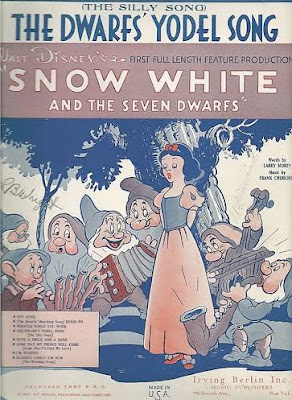Pre-Snow: Carl Stalling and the Silly Symphony--
(Right: The Skeleton Dance title plate. Copyright 1929 Disney.)Walt Disney knew early on that he would need his own in-house music for sound cartoons. In 1928,
Carl Stalling, Walt's associate from Kansas City became the studio's composer, creating the scores for many of the early Disney shorts. Stalling's desire to raise the musical bar for his compositions led to discussions with Walt into what should come first, the orchestration or animation. From these talks were born the
Silly Symphonies which allowed Stalling to compose more elaborate pieces. Sometimes the animators would match their drawings to the completed music, other times it would work in reverse.
Stalling pioneered the use of the "tick system" of recording music to animation:
The thought struck me that if each member of the orchestra had a steady beat in his ear, from a telephone receiver, this would solve the problem. I had exposure sheets for the films, with the picture broken down frame by frame, sort of like a script, and twelve of the film frames went through the projector in a half second. That gave us a beat.
Carl Stalling from an interview via MichaelBarrier.com.
After two productive years, Stalling left Disney at the same time as Ub Iwerks. Eventually he found himself at Warner Brothers in 1936 where he would work for the next 22 years writing approximately one score per week for their
Looney Tunes and
Merrie Melodies shorts.
_______________________________________________________________________________
The Big Bad Wolf: Frank Churchill--Filling Stalling's shoes at Disney was
Frank Churchill. A pre-med student at UCLA, Churchill dropped out of school to pursue a career in music and took jobs at radio stations and at RKO-Radio Pictures. It was 1930 when he was hired by Walt to be a composer on the
Silly Symphonies. He scored nearly 65 animated shorts over his career, but it only took Churchill three years to strike gold. In 1933, he composed Disney's first smash hit, "Who's Afraid of the Big Bad Wolf?" for the
Three Little Pigs. It changed the way music was thought of at the studio. Creating original memorable songs would now become a integral part of the filmmaking process.
Frank Churchill (right) with Walt Disney and Wilfred Jackson. Image via Michael Sporn Animation from the Filmguide’s Handbook to Cartoon Production by Harold Turney, copyright 1940. The success of 'Big Bad Wolf' landed Churchill the dream job of composing the music for
Snow White and the Seven Dwarfs. But he would not do it alone.
_______________________________________________________________________________
The Songs: Larry Morey--
Larry Morey came to the Disney studio in 1933. He's credited as a Sequence Director on
Snow White, but his name is remembered more for his authoring of the lyrics to all of the songs in the movie. Working with Frank Churchill's music, the two of them created 25 tunes from which 8 were chosen for inclusion in the final film.
Walt made it clear to the composers that he wanted the songs integrated into the story. "Dialogue and music work together...use the dialogue to lead into songs naturally."
[p.40, Walt Disney and Europe by Robin Allan]. He wanted the musical numbers to spring accordingly from the characters rather than causing abrupt interruptions in the flow of the story. Churchill and Morey rose to the task swimmingly.
The original eight recorded songs (vocal artists in parentheses):
1-I'm Wishing (Adriana Caselotti) 2-One Song (Harry Stockwell)3-With A Smile and A Song (Adriana Caselotti)4-Whistle While You Work (Adriana Caselotti)5-Heigh Ho (Roy Atwell, Pinto Colvig, Billy Gilbert, Otis Harlan, Scotty Mattraw ) 6-Bluddle-Uddle-Um Dum or The Dwarfs' Washing Song (Roy Atwell, Pinto Colvig, Billy Gilbert, Otis Harlan, Scotty Mattraw)7-Dwarfs' Yodel Song or The Silly Song (Roy Atwell, Pinto Colvig, Billy Gilbert, Otis Harlan, Scotty Mattraw, with yodeling by James MacDonald ) 8-Someday My Prince Will Come (Adriana Caselotti)Two additional recorded songs were cut from the final film. The first was dropped when the soup-eating scene was pulled by Walt. The second was replaced by "The Silly Song".
A-Music in Your Soup (Roy Atwell, Pinto Colvig, Billy Gilbert, Otis Harlan, Scotty Mattraw ) B-You're Never Too Old to Be Young (Roy Atwell, Pinto Colvig, Billy Gilbert, Otis Harlan, Scotty Mattraw ) "Heigh-Ho" Sheet Music from the Snow White Souvenir Album. Image copyright 1938 Bourne Co.
_______________________________________________________________________________
The Oscar Nominated Score: Enter Leigh Harline and Paul Smith--
In addition to writing the songs, Frank Churchill co-composed the instrumental score with
Leigh Harline and
Paul Smith. Harline joined the Disney team in 1932; Smith arrived two years later. Inspired by concept art and storyboard illustrations, they worked and weaved the different musical segments of the film together. From the "Overture"opening and the dark forest escape to the climatic witch chase and final choral reprise, the trio of young composers created a dramatic score the likes of which had never been heard before at the Disney Studios.
Paul Smith. Image via Original Mickey Mouse Club Show Website. Copyright Disney. Frank Churchill also arranged the entire score and conducted the Disney orchestra during the recording sessions.
The Disney Orchestra. Image via Michael Sporn Animation from the Filmguide’s Handbook to Cartoon Production by Harold Turney, copyright 1940.For their efforts, Churchill, Harline and Smith earned an Academy Award nomination for "Best Music, Score" in 1938. Their orchestration, along with Larry Morey's lyrics, became the first ever commercially-released movie soundtrack...and it sold like crazy.

































